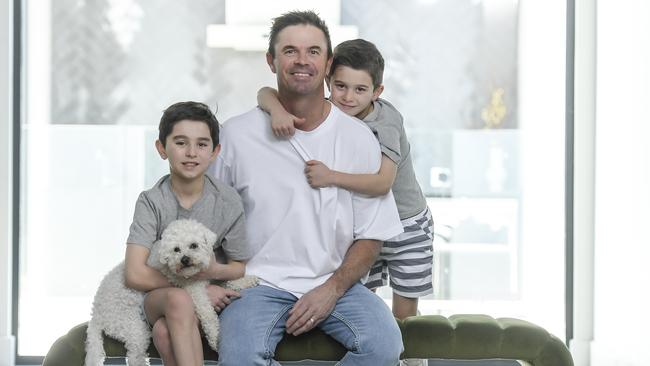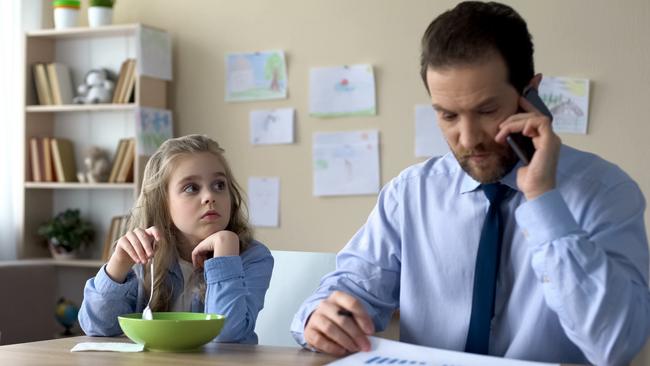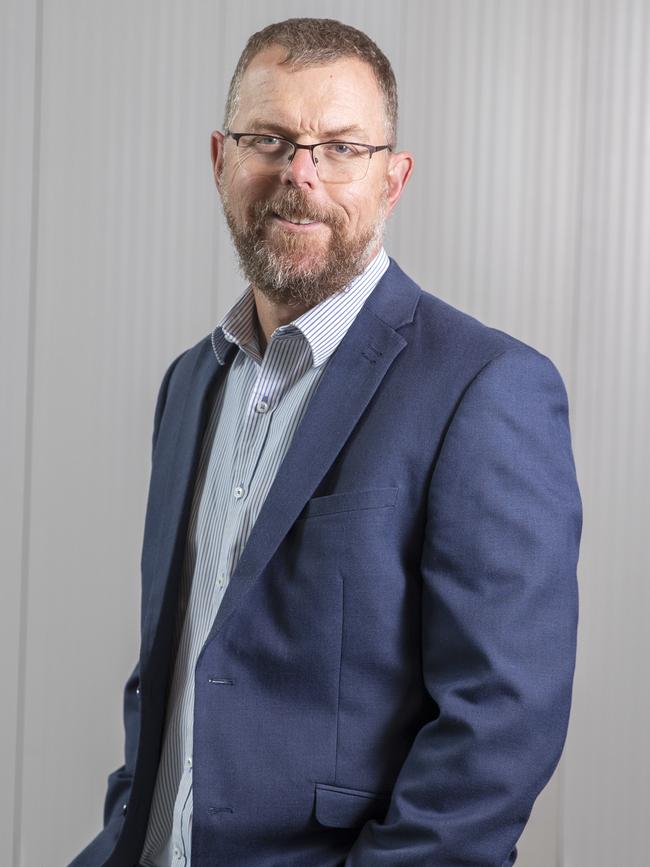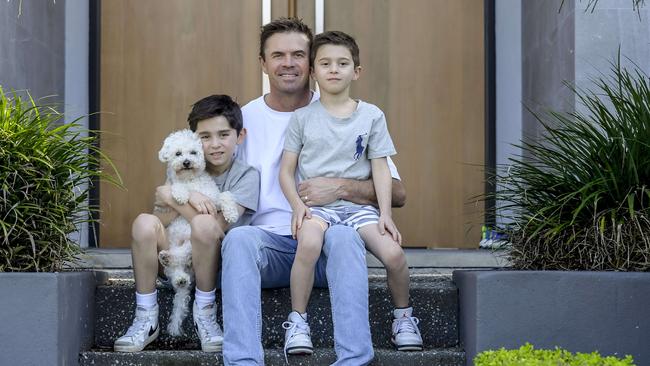Father’s guilt: Dads reveal the pain of missing key moments in their children’s lives
It only took a few minutes for this group of professional men to realise they all shared the same struggle.

VWeekend
Don't miss out on the headlines from VWeekend. Followed categories will be added to My News.
It’s 8.30am, I’m at work and tears are rolling down my face. I’ve found an unoccupied corner office and I’m on the phone to my teenage daughter, who is curled up in a ball at home in her bedroom grappling with a mental health crisis.
My heart is torn in two and I sob as I apologise for not being able to be there in person. To hold her. To help her. To be a shoulder for her to cry on. I’m devastated I’m not there. But it’s critical that I’m in the office today, and I can’t be in two places at once.
My daughter understands. So does my wife, who is with her in the bedroom. They tell me they’ll be OK without me. Tell me not to worry. Tell me to stay at work. And so I do. After a few minutes composing myself, I switch back into work mode.
Well, at least I try. It’s hard today. Harder than normal. The guilt of two decades of missing key moments in the lives of my three wonderful daughters has all come to a head.
The demands of a professional working life have meant I’ve missed countless events, from birthday parties to school functions and parent-teacher interviews to weekends away to dance concerts.
Missing any key moment has always come with a heavy heart, but today, as I emerge from the corner office wiping away the tears, the sense of guilt is almost overwhelming.

Let’s call it father’s guilt. It’s the guilt we men feel when we haven’t been able to live up to the parenting expectations we put on ourselves. It’s a guilt we feel when we’ve been unable to balance our need to provide for our family with our need to spend time with them.
Most men of my vintage (I’m 51) have had it drummed into us since we were knee-high to a grasshopper that a father’s primary purpose is to provide a financially secure base for our family.
But this focus has come at a cost. A quickly convened roundtable of dads in the office reveals father’s guilt is something we have all had to grapple with.
“That guilt is so damn real,” says one dad, the father of girls aged 13 and 10.
“I have a huge amount of guilt because of the kids’ childhood that I missed either as I wasn’t physically there because of my job, or I wasn’t ‘present’ with them when I was on my phone doing work.
“There was a time in my life when my focus on my work was greatly disproportionate to what it should have been. I was doing 60-plus hours a week and I was never home at night.
“The damage that has caused, not only with being a dad, but in my marriage, is still not completely repaired.
“That guilt is something that I grapple with every day. Looking back at photos or reminiscing about things where I either wasn’t there or work’s gotten in the way and I’ve been on my phone, I wish I’d listened to anyone who slammed it into me that, when you’ve got young kids, the nights and days can be really long, but the years are just so incredibly short.”


We are a group of five dads whose children range in age from eight months to 32 years. It’s a chat I’ve convened for this article, and it doesn’t take long to discover two things.
First, we’ve all had to navigate similar scenarios. Second, it’s a topic we never really talk about – especially among work colleagues.
“Time is everything when you look back on it, especially now that the kids are old and you think of things you’ve missed and the times you wish you had been there,” says the oldest of our cohort, whose sons are both now in their 30s.
“But you’ve got to balance that with the part of your role as a father, and part of the way you express your love is being a provider; of being able to put a roof over their heads, food on the table, schooling and all that sort of stuff.”
It’s a sentiment shared around the table, but the complexity and technology of the modern world add a dimension that we didn’t have to deal with when some of us entered the workforce.
“My role is officially Monday to Friday, but there are so many times on weekends … when I’m on the phone for work and that’s when I feel that guilt,” says the father of children aged five and two.
“It’s a weekend and this is supposed to be family time, but you’re always only a minute away from a phone call, and that’s probably when I feel it.
“There’s probably that guilt that being on my phone eats into the family and kids’ time.”
The youngest in our conversation has only been a dad for eight months and admits he already feels guilty about leaving his baby son at home with his wife while he goes off to work.
But he’s pleased to hear the rest of us open up about our own experiences, and says it’s important for each generation to learn from the ones that have gone before.
“I feel like I’m learning what not to do in terms of your job,” the new dad says. “It’s very refreshing to hear someone say ‘yes, I’m successful, yes, I do my job well but I have regrets about that’.
“It’s important to hear those stories. Work is important to me and being ambitious is important, but only to a point. If I can’t have a good work-life balance, then that’s a conversation that me and my partner have to have. Or I have to have a look inside and go, ‘What is actually worth it to me?’.”
There’s a therapeutic feeling to our conversation but it’s worth pointing out that our focus group is neither scientific nor representative. The abnormal hours and requirements of working in a metropolitan newsroom throw up a few curveballs not faced in many other workplaces.
But many of the themes are universal – predominantly the juggling act we all endure as we balance work and family.
“No matter what you do, there is always going to be balancing,” one of us says. “I don’t think there is such a thing as the perfect job, where you can earn a good living and still be there every second of every day with your kids.”

‘I’m just loving being around, being more present’
Greg Blewett knows how blessed he is to be able to spend so much time with his sons Sam, 9, and Rory, 8 these days.
The former Australian cricket star’s primary job these days is as a radio host on Triple M’s Rush Hour, between 4pm and 6pm on weekdays.
This means he can be responsible for school drop-off, is usually home by 6.30pm, and is with his boys every weekend. Things change in summer, when cricket commentating commitments with Triple M and Channel 7 can take him interstate for days at a time. But by that time of the year, Blewett jokes, his family is happy to have a break from him.
It’s a far cry from when he first became a dad to daughter Taylor 23 years ago, when he was still a professional cricketer and spent months at a time on the other side of the world.
The devoted father – who was 29 when he had Taylor with first wife Jodie Oddy – phoned home regularly when he was away, but admits it was tough not being able to hold Taylor or even see her face.
“I’d go away for three or four months at a time, and they were always tough,” says Blewett, now 52.


Even when he was back in Australia, Blewett was often interstate for Taylor’s birthday (she was born in January) and even Christmas because of cricket commitments.
“I’ve had conversations with my daughter as she’s gotten older, where she’s brought up a few things that she went through that I wasn’t aware of because I was away,” he says.
“Straight away, that brings back those guilty sort of feelings about not being around enough when she was younger. I just thought she was the perfect kid and had a great life. She had her moments when she was at school that I knew about but to hear some of the other things (that she went through) was challenging.”
The selfish and demanding nature of life as a professional athlete meant he had to make a conscious effort to spend quality time with Taylor when he was home.
Blewett separated from Oddy when Taylor was two, but became a father again when new wife Katheryn had Sam and Rory.
And he’s relishing the chance to spend so much time with them.
“I’m just loving being around, being more present, being at the boys’ sport, being able to go to parent-teacher stuff … I suppose being a bit more of a normal parent,” he says.
“I think I’m really lucky at the moment. My contact hours with my kids would be way more than probably 90 per cent of fathers. I’m just lapping it up – absolutely lapping it up.
“I just absolutely love hanging out with my kids.”

Lydia Woodyatt, a professor in psychology at Flinders University, says father’s guilt is often felt more by those whose working hours differ from the norm, such as shift and fly-in-fly-out workers.
Professor Woodyatt says guilt appears when humans violate an expectation of what they should or shouldn’t be doing, and society has trained dads to believe they should be at events such as Saturday morning sport or birthdays.
A father is less likely to feel guilt, she says, if he misses what has traditionally been seen as something the mother would take care of, such as attending a midweek childcare morning tea.
“What is guilt from a social, psychological evolutionary perspective?” Woodyatt ponders. “We’re talking about an evolved motive that’s particularly associated with responsibility around caregiving and protection of young.
“It’s essentially an emotional state that stops us from allowing harm to happen to our children, or people we are responsible for.
“We also see guilt in heightened situations where we have other kinds of responsibilities. We see it in people’s responsibilities for pets, for the elderly, for their infirm parents or for people who have responsibilities at work. These kinds of situations can have a heightened risk of guilt.”
Woodyatt says parental guilt is most commonly felt by women returning to the workforce, when they violate the societal expectation that a mother should be home with her children.
Fathers who abide by stereotypical values, she says, generally feel less guilt about missing key family moments because of work commitments because they are adhering to their traditional role of providing an income.
The lines start to blur, though, and father’s guilt becomes more prevalent in families with a more modern, gender-balanced view of parenting, which would seem to be the case for the dads who take part in our round table.
“Guilt is totally determined by our culture and context in terms of what is expected of us,” Woodyatt says.
“This is one of the risks around people’s wellbeing when we talk about things like shift work and fly-in-fly out work. There’s a degree of relationship instability that can be created by these roles.
“When we talk about mental health and wellbeing in the workplace, we often talk about just the things that are happening at work, and we don’t recognise that these things also impact on our real lives outside of work, and they are actually sometimes the things that are causing us the most tension or the most pain.”
Woodyatt’s research is primarily on self-forgiveness – essentially how to deal with guilt – and she says recognising and pursuing our own values is the first step parents can take to alleviate feelings of child-related guilt. “People need to ask themselves: What’s the value that really matters to me in this circumstance? How do I act? Why does it matter to me?
“And how do I act consistently with that value in this situation moving forward, recognising the limitations that are on me. Value-consistent behaviour is really central to working through guilt.”
I try to put this in context by asking if a group of cavemen sitting around a campfire tens of thousands of years ago would have experienced any sort of father’s guilt.
“The theory would be yes – to the degree that their job is to drag home some meat and they may feel guilty if they weren’t dragging home that meat,” she says.
“Whatever our role is in the caregiving situation, we can feel guilty about that. That plays out in what we know about the things that men feel bad about traditionally, in terms of breadwinning and income.
“And that’s shifting with the younger generation that emphasises more on the relational side and being available to your children. The key to guilt is around not fulfilling those responsibilities – however we frame and understand them.”
Woodyatt says parents need to also recognise that they are only human, and to extend themselves some kindness.
Oh, and that dads, like the ones in our roundtable, need to start talking about how they are feeling.
“I think normalising can help,” she says. “I mean, that’s an interesting one, right, that dads can carry this, and then they don’t really talk about it. Women talk about this stuff all the time, by the way, and that’s partially because women experience that work-life discrepancy and work-caring discrepancy.
“But it’s really important for dads to talk about this stuff, and that’s the importance of having friends who are dads and the importance of male friendships.
“It’s the normalising. Of recognising that you’re not a bad person, just because you feel guilty – your emotion doesn’t mean you are a bad person. Actually, the fact that you feel bad is a sign that you care.”
■ If you need support, contact Lifeline 13 11 14; Mental Health Access Line 1300 642 255; Suicide Call Back Service 1300 659 467; 13YARN 13 92 76; Beyond Blue 1300 22 4636
More Coverage
Originally published as Father’s guilt: Dads reveal the pain of missing key moments in their children’s lives





